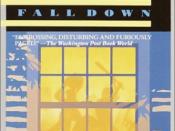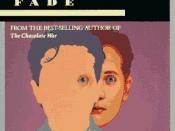Omission An Underlying Theme in Robert Cormier's Novels Robert Cormier's 13 novels have brought a complete new meaning to the young adult genre, by showing a darker, deeper side of adolescence, something writers before his time had dare not write about. He received a lot of criticism on his books because they were said to be too vulgar for younger children. Essentially, though, what Cormier is doing is shining light on all the unspoken, grim realism of life. Instead of giving people an escape from life, he takes life "" both the bad and the good "" and shoves it right up in the readers face. He often disappoints the reader by the themes in his books. One of the most significant themes is the sin of omission. Many of his characters commit the sin of omission, a sin of doing nothing to either stop the problem or help the good.
This reflects Cormier's view on real life: sometimes the worst thing one can do is nothing.
One of Cormier's greatest strengths as a writer, besides the rhythmic flow and the brilliant use of similes and metaphors, is his ability to take ordinary American suburban life and to show it from the perspective of a child who sees all things that the adults have miss or avoid. He separates the main character from the rest of society, thus making them an outsider or loner. This comes a lot from Cormier's belief that, as he says himself, "I have always had a sense that we are all pretty much alone in life, particularly in adolescence." This is Cormier's view and he shows it especially through the adults, who are often rather complacent and blissfully unaware of their children's angst and crises. Jerry's father in The Chocolate War didn't even have any clue as to the life altering decision that Jerry was facing; Jason's mother did nothing in The Rag and Bone Shop to stop the interrogator from ruining Jason; Danny's father in The Middle of the Night did help either himself or Danny; Lori's mom in Tenderness was so caught up in her own pathetic life that she forgot her daughter's birthday. The younger children are forced to stand-alone against a problem that is usually over their head, and therefore they usually fail to overcome it. As adolescents we are forced to make some hard decisions early in our life that will shape our life forever, and there is usually no one for us to fall back on, so when we do fall, we fall hard. This is what Cormier is trying to show through the parental figures in his books.
In an interview Cormier was asked why he chooses to write about the darker side of life. His response was, "On the surface they may seem dark, but a closer reading reveals moral values." He presents his themes through the use of symbolism, showing something small and seemingly insignificant, that may reflect something bigger. In The Chocolate War Jerry questions a poster that says, "Do I dare disturb the Universe?" Can one boy successfully change something so big and strong? When all his friends desert him, and his life is falling apart in front of his eyes, can he still resist temptation and be loyal to his values? Cormier doesn't think this is possible, and in real life, it usually isn't. The odds are against him, and he eventually breaks down and becomes the "animal" that he was fighting so hard against. In these novels good doesn't usually conquer evil, because isn't there usually some evil in the good as well? Who is to say what is evil and what is good? Our society? Take Larry Lasalle, for example. He helped so many small children and was a role model to all of them, but according to him, "Does that one evil thing I do take away all the good things?" What about the kids he helped to become great people, and were oblivious to the fact that he wasn't a decent person at all? Eventually, though, he kills himself because of his guilt.
Francis's life also shows the consequences of the sin of ommision. For him, it led to him wanting to take his own life because of the guilt he felt for not stopping Larry LaSalle from raping his girlfriend, Nicole. Francis stood there, half shocked and half brainwashed, and let the minutes tick by while poor little Nicole Renard's is scarred for life. But the irony of this story is that, in the end, Francis is the one more scarred than Nicole because she had done nothing wrong and has all the reason to move on in her life, while he has to deal with guilt for the rest of his life. Francis is constantly haunted by the image of Nicole knowing that he could have stopped the rape and did nothing. This guilt haunts him to the point that he spends the rest of his life avenging her rape.
Cormier's novels blur the line of good and bad. Sometimes even a person who has never done anything bad in his life may still be an antagonist because he chooses to do nothing about the problem. In some ways, Danny's father in The Middle of The Night is the antagonist because by doing nothing he is destroying his whole family's life. Because of some devastating thing in the past, he forbids his son to lead a normal life. He stops his child from getting a license and a car, and even frowns upon the idea of his son having a job. It would be so easy for him just to stop the phone calls, but he doesn't; he feels helpless against it, and by not doing anything he affects his sons life. When people do nothing to stop a problem, they make victims of the problem helpless. By the time they realize they have to sacrifice something in order make things better in the future, it is usually too late and the problem is already too big to stop.
Danny, in turn, also commits the sin of omission in this story. Danny is an introvert who chooses to go through life attempting not to be seen, and only doing the minimal amount of things required. When given the chance to make a difference, he draws into himself. When a peer of his is getting bullied, Danny stands there as the only witness but does nothing about it. After all, it isn't his problem and why should he get involved? All he had to do was simply make an attempt to help the boy, because even if he failed, he would have had a clear conscience knowing he tried. But he didn't choose to do that; instead he chooses to go through life interfering with no one and nothing.
As human beings we are always in search of resolution, or at least the illusion of an resolution. But Cormier denies the reader a resolution. In Cormier's books, even if the characters walk off into the sunset, there is going to be a cliff waiting right around the corner. None of his characters is faultless, because everyone sins, it is inevitable. The ambiguity of the characters and the plot makes the reader so hungry for more that one can't put the book down, Yet when one is done, he is left with a feeling of disappointment. Instead of telling one what is right, Cormier shows one what is wrong, and leaves him to conclude what is right. Because in real life we do not always know what is right and wrong, or whether we should step in and stand up for someone or something just, or be passive and not do anything. This is the reason his books reflect real life, because there isn't always resolution in real life.





